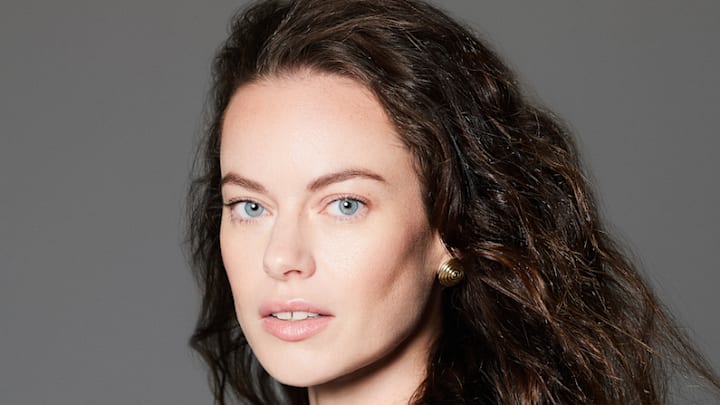This Breast Cancer Survivor Is Advocating for Equitable Care, Advanced Screenings

October is Breast Cancer Awareness Month. According to the National Breast Cancer Foundation, one in eight women in the U.S. will develop breast cancer in their lifetimes. Aside from skin cancer, breast cancer is the most common cancer among U.S. women. This October, SI Swimsuit is committed to providing resources for breast cancer patients while sharing the stories of warriors who have been impacted by the disease. For more information, click here.
Despite having no family history of the disease, Emily Rockefeller was diagnosed with early-stage breast cancer in 2022 at the age of 32. After noticing a cyst in her breast, Rockefeller followed her gut and erred on the side of caution, bringing her concerns to her OB/GYN. While her discovery was in fact a cyst, her doctor discovered an incidental finding of breast cancer.
Following her diagnosis, Rockefeller underwent genetic testing and learned she had the BRCA1 gene, which was inherited through her father. Given the opportunity to have a radiation with a lumpectomy or a bilateral mastectomy, and armed with the knowledge that she was a carrier of the gene mutation, Rockefeller opted for the latter.
“Dr. Lisa Newman, my surgeon, performed a nipple- and skin-sparing procedure with intraoperative sentinel lymph node biopsy,” Rockefeller explains of her treatment. “After surgery, I had spacers in place for several months before undergoing reconstruction with Dr. David Otterburn, a plastic surgeon who has a special focus on sensory return to the breast.”
Two years prior to her cancer diagnosis, Rockefeller had undergone genetic testing as she and her now husband, Charles, were getting engaged and discussing starting a family. At the time, she received a clean bill of health.
“I said to my doctor, ‘Why don’t they test for BRCA and ATM and all these other genes that we know cause cancer?’” Rockefeller says. “Because lots of women are doing IVF in the years before they start mandatory [breast cancer] screening when you’re 40, when you’re 50, when you’re 60. So I was like, why don’t they just offer that if you’re doing the testing panel anyways, because you can catch a lot.”
Making cancer screenings more routine in prenatal genetic testing
After posing the question to her physician, Dr. Melissa Frey, Director of Genetics and Personalized Cancer Prevention Program at Weill Cornell Medicine, Rockefeller’s advocacy inspired a new clinical trial at the Genetics and Personalized Cancer Prevention Program at Weill Cornell Medicine called “FOCUS” (Feasibility of Obstetric and Cancer Universal Screening). The trial presents the option for individuals to opt in to hereditary cancer screenings in addition to being screened for obstetric carrier conditions.
“Pregnancy is a period when women are highly engaged with their health, closely connected to care teams and commonly considering genetic testing,” Dr. Frey explains. “The American College of Obstetricians and Gynecologists (ACOG) recommends that all women receiving preconception or prenatal care be offered obstetric carrier screening for conditions that can affect offspring. Traditionally, cancer-predisposition genes have not been included in preconception testing, representing a missed opportunity to identify women at elevated cancer risk at an age when enhanced screening and risk-reducing surgery can be most impactful.”
Dr. Frey adds that roughly 80% of people with a genetic predisposition to cancer are not aware. Thus, incorporating hereditary cancer screenings into prenatal care can not only assist with early detection, it can also empower women to take charge of their breast and reproductive health. That’s exactly what Rockefeller has done for herself while using her personal story to equip other women to do the same.
“ This finding may have saved my life,” Rockefeller says. “I’m usually a private person, but then I realized the more I talked about this and the more ideas it was sparking that the power of storytelling is really important—not only for doctors in the medical field, but for everybody. [It’s important too for] men that carry the BRCA gene to tell their daughters to get tested and they themselves should be getting checked for prostate cancer and pancreatic cancer.”
As a BRCA1 carrier, there is also a higher lifetime risk for Rockefeller to develop ovarian cancer and pancreatic cancer. On the day that Rockefeller and I spoke in late September, she and her husband were eagerly awaiting the arrival of their daughter via surrogacy. Her next step related to her health, she mentioned, was looking into getting screened for ovarian cancer.
However, when we spoke again just over two weeks later, following the arrival of her sweet baby girl, Rockefeller was inspired by her daughter to take quick action. On Nov. 18, she will have her fallopian tubes removed by Dr. Frey in order to significantly reduce her risk of developing ovarian cancer.
How to calculate your breast cancer risk and what to know about supplemental breast cancer screenings
One of the easiest ways to take charge of your breast health is by knowing your estimated risk for developing invasive breast cancer within your lifetime. The Breast Cancer Risk Assessment Tool is free and estimates your risk based on factors like age, when you got your first menstrual period and family history, among others.
“Knowing your risk score allows your care provider to develop personalized screening and prevention plans,” Rockefeller explains. “For women under 40, a high risk score may qualify you for earlier screening. It’s often repeated, but it’s true: early detection saves lives.”
While it is recommended for women with an average lifetime risk of developing breast cancer to begin mammogram screenings at the age of 40, there are additional tools that can help detect breast cancer—particularly for women with dense breasts. Your doctor can inform you of your breast density following your mammogram, and additional screening measures can then be implemented if needed.
“If you learn that you have dense breasts after your first mammogram, be sure to ask about supplementing your screening with a sonogram or MRI,” Rockefeller suggests. “Tumors can easily hide in dense breast tissue and may be difficult for radiologists to detect with a mammogram alone. In the future, I hope the gold standard will be for all women to have access to the most sensitive screening methods available.”
Shoes for a Cure
One of the many ways in which Rockefeller is using her platform to bring attention to breast cancer awareness is through her involvement with Shoes for a Cure, the footwear industry’s largest fundraising event. The 34-year-old serves on the Board of Directors for the Fashion Footwear Charitable Foundation, which powers the annual event.
This year, Shoes for a Cure will be held Oct. 22 through 26 at New York City’s Chelsea Market, and proceeds from the event’s footwear sales will benefit Dr. Newman’s breast cancer research programs in New York and Africa. One of her particular areas of expertise lies within the disparities in breast cancer health, particularly when it comes to Black women, as Dr. Newman is the Founder and Executive Director of the International Center for the Study of Breast Cancer Subtypes (ICSBCS).
“Disparities in breast cancer outcome are a consequence of multiple factors: socioeconomic disadvantages and barriers to health care access are major causes, but variation in tumor biology, genetics and environmental exposures also contribute,” Dr. Newman says. “Breast cancer disparities research is therefore essential in achieving health equity, and it is also an imperative in identifying the root causes as well as optimized treatment for this disease.”
Since its inception in 1993, Shoes for a Cure has raised more than $65 million for breast cancer research. For those who wish to contribute to the cause but are not local to New York City, donations can be made to Shoes for a Cure here.
“While I am grateful for the care and resources I have had access to throughout this time, I recognize that my experience is not universal,” Rockefeller concludes. “ ... I am aware that many people face significant barriers when it comes to accessing healthcare support and options. I share my story with full awareness of these privileges and with the hope that, by highlighting both my experience as well as disparities in the system, that we can work toward a more equitable care for everyone and support programs such as Shoes for a Cure.”
PINKTOBER resources EDITED AGAIN. https://images2.minutemediacdn.com/image/upload/v1759326461/images/voltaxMediaLibrary/mmsport/si_swimsuit/01k6g0epzrfe5pbhp511.jpg. https://images2.minutemediacdn.com/image/upload/v1759326461/images/voltaxMediaLibrary/mmsport/si_swimsuit/01k6g0epx2cbb70y4kje.jpg. Resources for POC. https://images2.minutemediacdn.com/image/upload/v1759326461/images/voltaxMediaLibrary/mmsport/si_swimsuit/01k6g0epzmb0pcez0mvb.jpg. Community Support Guide. Breast Self-Exam How To
